Best Antivirus Software
Best antivirus software in India are Bitdefender Antivirus Plus, Norton 360 With LifeLock, and Webroot SecureAnywhere for Mac. Best antivirus system helps in the prevention, scanning, detection, and removal of viruses from the computer.



No Cost Personal Advisor
List of 20 Best Antivirus Software
Category Champions | 2024
Award winning antivirus software
Bitdefender Security for Endpoints is the smart choice as it gives the best combination of leading performance and detection in independent tests, advanced remote administration console, and value for money. Read BitDefender Reviews
Explore various BitDefender features, compare the pricing plans, and unlock the potential of seamless operations by selecting the right software for your business.
Features
View all BitDefender Features- Anti-Phishing
- Anti Virus
- Email Attachment Protection
- Blocks and Removes Annoying Adware
- Anti Spam
- Event Tracking
- Fast Scanning
- VPN
Pricing
BitDefender Caters to
- StartUps
- SMBs
- Agencies
- Enterprises
Category Champions | 2024
Software by Avast Software
Make your MAC system immune to any sort of cyber attacks by using high-end MAC protection software, Avast. Stop Wi-Fi intruders to infringe with your database and stay safe from all sorts of ransomware. Read Avast Reviews
Explore various Avast features, compare the pricing plans, and unlock the potential of seamless operations by selecting the right software for your business.
Features
View all Avast Features- Desktop scans
- Web Security
- Privacy and security
- Ransomware Security
- Detect viruses
- Fast Scanning
- Anti-Malware Security
- Wi-Fi Security Scan
Avast Caters to
- StartUps
- SMBs
- Agencies
- Enterprises
Category Champions | 2024
Software by ESET
ESET Smart Security keeps you safe online, every day, with all-in-one security including Antivirus, Anti-Theft, Personal Firewall – and much more. ESET Smart Security runs on any system with Microsoft® Windows® 10, 8.1, 8, 7, Vista, XP (Service pack 3), and Microsoft Windows Home Server 2003, 2011. Read ESET Smart Security Nod32 Reviews
Explore various ESET Smart Security Nod32 features, compare the pricing plans, and unlock the potential of seamless operations by selecting the right software for your business.
- Firewall
- Multiple Server Monitoring
- Anti Virus
- Online Backup
- Basic Firewall
- Anti-Phishing
- Advanced Firewall
- Network Monitoring
ESET Smart Security Nod32 Caters to
- StartUps
- SMBs
- Agencies
- Enterprises
Category Champions | 2024
Systweak Antivirus
Systweak Antivirus Gives Real time protection, malware protection, regular updates to keep your data safe. It helps in detect virus, malware those are harm for your system. Read Systweak Antivirus Reviews
Explore various Systweak Antivirus features, compare the pricing plans, and unlock the potential of seamless operations by selecting the right software for your business.
Features
View all Systweak Antivirus Features- Anti Virus
- Vulnerability Scanning
- Spyware Removal
- Internet Security
- IP Protection
- Anti Spam
- Web Traffic Reporting
Pricing
Systweak Antivirus Caters to
- StartUps
- SMBs
- Agencies
- Enterprises
Category Champions | 2024
Antivirus software and spyware removal
Norton is best anti virus software for enterprise. It provides ultimate peace of mind for what you do online. Secures each and every click by user. Actively protects you from viruses, spam, identity theft and social media dangers. Read Norton Reviews
Explore various Norton features, compare the pricing plans, and unlock the potential of seamless operations by selecting the right software for your business.
Features
View all Norton Features- Email Attachment Protection
- Privacy and security
- Detect viruses
- Desktop scans
- Safe Files
- Desktop Notifications
- Web Threat Management
- Privacy Protection
Pricing
Norton Caters to
- StartUps
- SMBs
- Agencies
- Enterprises
Category Champions | 2024
Total PC Protection: AntiVIRUS + Internet Security
Net Protector AntiVirus incorporates a very strong Anti Virus and Internet Security to protect your Home PC from all such attacks and threats. Install Net Protector and use your PC for connecting to various devices safely. Your PC will remain protected from these latest new virus sources, Spywares, Malwares, Worms. Read NP AV Reviews
Explore various NP AV features, compare the pricing plans, and unlock the potential of seamless operations by selecting the right software for your business.
Features
View all NP AV Features- Event Tracking
- IP Protection
- Email Alert
- Intrusion Detection System
- Internet Security
- Anti Spam
- Internet Usage Monitoring
- Web Traffic Reporting
Pricing
NP AV Caters to
- StartUps
- SMBs
- Agencies
- Enterprises
Contenders | 2024
Secured Digital Experience
REVE Antivirus is an IT Security software, which provides protection from Virus, Spyware and all types of Malware ensuring complete digital security. The antivirus software is ideal for Home Users as well as Enterprises. Read REVE Antivirus Reviews
Explore various REVE Antivirus features, compare the pricing plans, and unlock the potential of seamless operations by selecting the right software for your business.
Features
View all REVE Antivirus Features- Anti Spam
- Email Attachment Protection
- Spyware Removal
- IP Protection
- Email Alert
- Anti Virus
- Internet Security
- Web Threat Management
Pricing
REVE Antivirus Caters to
- StartUps
- SMBs
- Agencies
- Enterprises
Contenders | 2024
Software by Malwarebytes
Malwarebytes is the best security software tool for protecting companies from harmful virus and content. It has modules which serves the best for application hardening, preservation of web content, finding the virus, payload and much more. It is very less time consuming and manages all the functions smartly and efficiently. Read Malwarebytes Reviews
Explore various Malwarebytes features, compare the pricing plans, and unlock the potential of seamless operations by selecting the right software for your business.
Features
View all Malwarebytes Features- Avoid web threats
- Browse safely
- Delete/Repair infected files
- Scheduled scans
- Internet Security
- Encryption
- Web Security
- Desktop Notifications
Malwarebytes Caters to
- StartUps
- SMBs
- Agencies
- Enterprises
High Performer | 2024
Keep virus free PC
Avira best free antivirus is an award winning product that provides complete protection against all types of threats, secures your data, protects your privacy and ensures your PC remains virus-free. Read Avira Reviews
Explore various Avira features, compare the pricing plans, and unlock the potential of seamless operations by selecting the right software for your business.
Features
View all Avira Features- VPN
- Web Traffic Reporting
- Event Tracking
- Password Manager
- IP Protection
- Email Attachment Protection
- Spyware Removal
- Anti Spam
Pricing
Avira Antivirus Pro
$ 21
Per Month
Avira Caters to
- StartUps
- SMBs
- Agencies
- Enterprises
Emergents | 2024
Software by F-Secure Corporation
F-Secure is a complete internet security tool that helps with virus protection, browsing protection, and parental control for children. It can support any size of businesses. It comes with a 30-days trial session having and is very fast, easy and simple to use. Learn more about F-Secure
Explore various F-Secure features, compare the pricing plans, and unlock the potential of seamless operations by selecting the right software for your business.
F-Secure Caters to
- StartUps
- SMBs
- Agencies
- Enterprises
Emergents | 2024
Software by BullGuard Ltd
BullGuard is an information security software for network safety. This network monitoring software helps to make an effortless process by providing multilayer protection, attention to children's safety, easy to set up and only sign in for authentic users to save personal data. Learn more about BullGuard
Explore various BullGuard features, compare the pricing plans, and unlock the potential of seamless operations by selecting the right software for your business.
Features
View all BullGuard Features- Anti Spam
- Anti Virus
Pricing
Basic
$ 30
Per Year
BullGuard Caters to
- StartUps
- SMBs
- Agencies
- Enterprises
Emergents | 2024
AntiVirus Protection & Programs
Panda Security is constantly innovating to provide better, real-time protection with a minimal impact on your computer. We are pioneers in creating security software that delivers top protection in a friendly and easy to use way, so that you don't have to worry. We've got your back. Learn more about Panda
Explore various Panda features, compare the pricing plans, and unlock the potential of seamless operations by selecting the right software for your business.
Features
View all Panda Features- IP Protection
- Anti Spam
- Anti Virus
- Vulnerability Scanning
- Spyware Removal
Panda Caters to
- StartUps
- SMBs
- Agencies
- Enterprises
Emergents | 2024
Software by Comodo
Comodo's free antivirus software provides the best protection from malware instances, virus infection, and suspicious hidden files. It is a reliable, cloud-based protection that scans quickly and updates continuously to include the latest malware information from around the globe. Read Comodo Reviews
Explore various Comodo features, compare the pricing plans, and unlock the potential of seamless operations by selecting the right software for your business.
Features
View all Comodo Features- Advanced Firewall
- Internet Security
- Block botnets
- Multilingual Support
- Basic Firewall
- Network Monitoring
- Identity Protection
- Longer Graph History
Comodo Caters to
- StartUps
- SMBs
- Agencies
- Enterprises
Contenders | 2024
Software by Sophos Ltd
Sophos is a free home network monitoring software. easy to set up, provide modern security, block unnecessary information and remote management. Also available on browser i.e internet explorer, chrome, and Firefox. It very secures your touchy medicinal services information very still, in movement, or being used, and support your efforts to follow HIPAA. Read Sophos Reviews
Explore various Sophos features, compare the pricing plans, and unlock the potential of seamless operations by selecting the right software for your business.
Features
View all Sophos Features- Safe Files
- Delete/Repair infected files
- Avoid web threats
- Anti Spam
- Desktop scans
- Desktop Notifications
- Anti Virus
- Detect viruses
Sophos Caters to
- StartUps
- SMBs
- Agencies
- Enterprises
Contenders | 2024
Software by Webroot Inc
Webroot is one of the best computer security software that finds endpoint protections. prevents internet issues and web-borne malware threats. Complete packaging with features i.e fast deployment, online arrangement, real-time data and offers intelligence stage. Immediate access at any time from anywhere. Read Webroot SecureAnywhere Reviews
Explore various Webroot SecureAnywhere features, compare the pricing plans, and unlock the potential of seamless operations by selecting the right software for your business.
- Privacy and security
- Privacy Protection
- Desktop Notifications
- Real Time Monitoring
- Fast Scanning
- Database Security Audit
- Password Protection
- Security Event Log
Webroot SecureAnywhere Caters to
- StartUps
- SMBs
- Agencies
- Enterprises
Contenders | 2024
Software by LogMeIn
Let LastPass remember all your passwords and lead tension free life. The password saver comes with in-build password builder that creates hard-to-decode passwords. Till now, 47,000 users have safeguarded their devices using this advanced password manager. Read LastPass Reviews
Explore various LastPass features, compare the pricing plans, and unlock the potential of seamless operations by selecting the right software for your business.
Features
View all LastPass Features- Single Sign On
- User Management
- Password Synchronization
- Password Management
- Access Request Management
- Password Reset
- Account Management
- User Provisioning
LastPass Caters to
- StartUps
- SMBs
- Agencies
- Enterprises
Category Champions | 2024
Security Simplified
Quick Heal provides IT internet security solutions to protect your PC, Mac, Mobile, Tablet, Server and others. Download the best antivirus software from Quick Heal India & stay protected. Read Quick Heal Reviews
Explore various Quick Heal features, compare the pricing plans, and unlock the potential of seamless operations by selecting the right software for your business.
Features
View all Quick Heal Features- Spyware Removal
- IP Protection
- Event Tracking
- Anti Virus
- Two-Factor Authentication
- Anti Spam
- Vulnerability Scanning
- Internet Security
Pricing
Quick Heal Internet Security
$ 20
Per Year
Quick Heal Caters to
- StartUps
- SMBs
- Agencies
- Enterprises
Contenders | 2024
Best security software by Trend Micro Incorporated
TrendMicro is an advanced computer security software which is specially designed for large companies. Internet security software is easy to install and is user-friendly. It has useful functionality like anti-malware, protecting your email, security against ransomware, and much more. Read Trend Micro Reviews
Explore various Trend Micro features, compare the pricing plans, and unlock the potential of seamless operations by selecting the right software for your business.
Features
View all Trend Micro Features- Anti Virus
- Encryption
- Browse safely
- Desktop scans
- Email Protection
- Detect viruses
- Avoid web threats
- Internet Usage Monitoring
Trend Micro Caters to
- StartUps
- SMBs
- Agencies
- Enterprises
Category Champions | 2024
McAfee for Consumer and Business
McAfee is best antivirus software solution deliver the highest levels of threat visibility and antimalware protection, including comprehensive system and endpoint protection, network security, cloud security, database security, and data protection. Read McAfee Reviews
Explore various McAfee features, compare the pricing plans, and unlock the potential of seamless operations by selecting the right software for your business.
Features
View all McAfee Features- Anti Virus
- Privacy and security
- Desktop Notifications
- Web Traffic Reporting
- Internet Usage Monitoring
- Anti Spam
- Email Attachment Protection
- Event Tracking
Pricing
Total Protection
$ 50
Per Year
Internet Security
$ 80
Per Year
AntiVirus Plus
$ 60
Per Year
McAfee Caters to
- StartUps
- SMBs
- Agencies
- Enterprises
Category Champions | 2024
FREE Antivirus & TuneUp apps for PC, Mac, Android
Avg antivirus software helps stop, remove and prevent the spreading of viruses, worms and trojans. It protects you from malware on your PC and helps stop anything that’s infected. Read Avg Antivirus Reviews
Explore various Avg Antivirus features, compare the pricing plans, and unlock the potential of seamless operations by selecting the right software for your business.
Features
View all Avg Antivirus Features- Email Alert
- Internet Security
- Anti Virus
- Anti Spam
- Event Tracking
- Intrusion Detection System
- Vulnerability Scanning
- Spyware Removal
Pricing
PRO
$ 143
Per Month
Avg Antivirus Caters to
- StartUps
- SMBs
- Agencies
- Enterprises
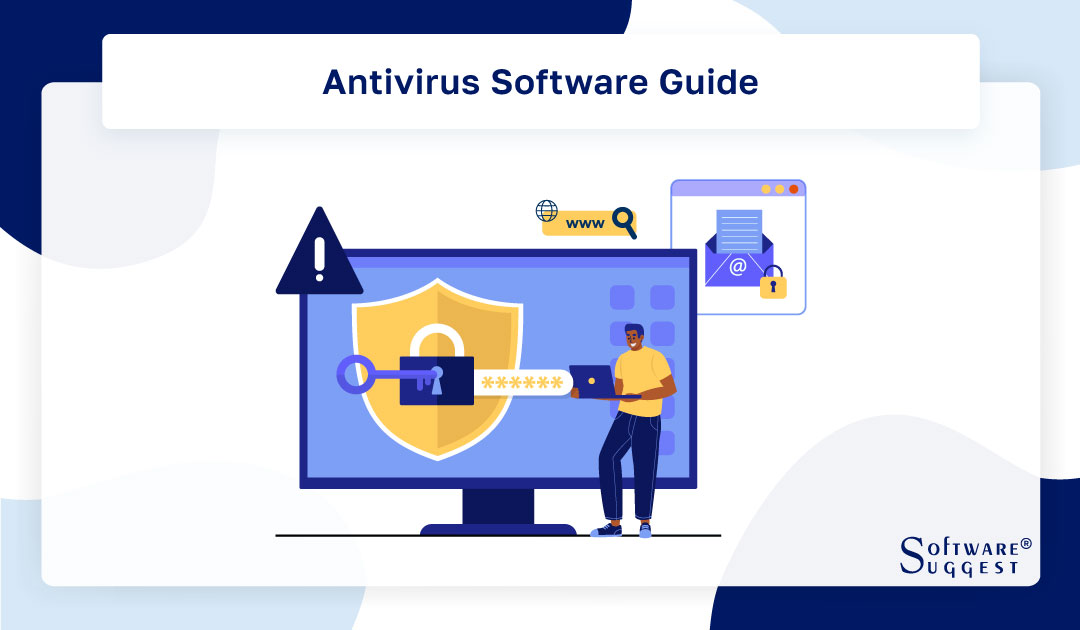
In the present era of rapidly advancing technology and increasing digitalization, the scope of cybersecurity risks has expanded significantly. A wide range of concerns looms over individuals daily, encompassing malware, ransomware, hackers, and identity theft. Given our growing reliance on technology in our daily routines, ensuring malware protection and the security of our electronic devices and data has become more critical than ever before.
This is where antivirus software comes into play. The best antivirus for pc is a crucial tool that should be used in order to safeguard your computer and mobile devices from viruses, hackers, and other forms of harmful attacks. The fact that there are so many different choices available on the market nowadays, however, can make selecting the best antivirus software seem like an impossible process.
In this buyer's guide, we will find out the best accessible solutions for anti-spam software, as well as their individual features and prices. With the help of this advice, you will be able to find the best antivirus software available that is suitable for both your finances and your requirements.
What is Antivirus Software?
Antivirus Software is a computer program designed to detect and destroy computer viruses. A virus may include anything from malicious Software to deadly viruses which can cause a threat to the system in any way. To be protected from these types of programs, which are threats to the system, antivirus software was developed.
Software is also developed according to the needs of the user. Not all antivirus programs are created equally. The detection engine is the main component of the best antivirus software for pc. The antivirus vendors continuously change the definitions for the engines and will occasionally push an update according to the change in the behaviors of the different viruses.
Different Types Of Virus Detection Techniques
Cybersecurity hazards have risen to previously unheard-of heights in today's dynamic technology environment. We increasingly rely on digital technology, which increases the need to safeguard our data and electronic gadgets against unwanted threats. This in-depth study will examine several virus detection techniques and their importance to identity theft protection.
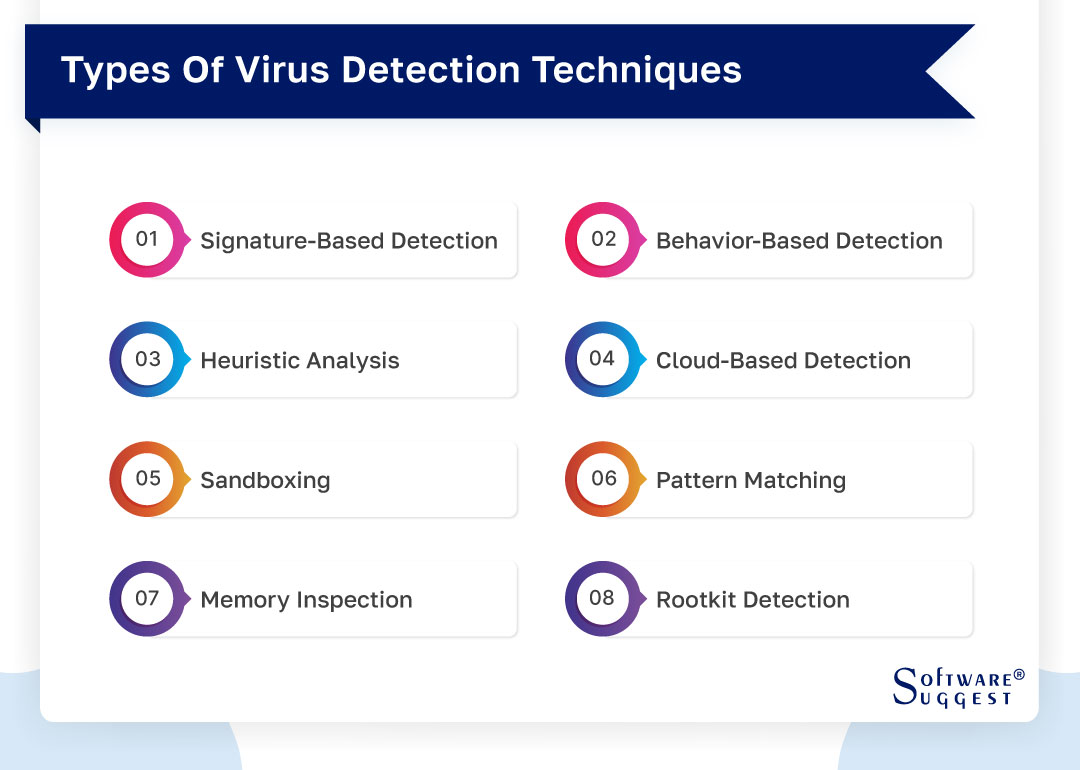
-
Signature-based detection
Signature-based detection, also known as definition-based detection, is a time-tested approach widely used to combat viruses. This technique relies on predefined signatures or patterns to identify known viruses. Antivirus programs maintain an extensive database of virus signatures, comparing them against files or programs during scans.
When a match is found, the application security system takes immediate action to quarantine or remove the infected file. While efficient at detecting known threats, signature-based detection may struggle with newer or modified viruses that lack existing signatures. Hence, making it essential to complement other techniques for comprehensive protection.
-
Behavior-based detection
Behavior-based detection takes a proactive stance by monitoring the behavior of software to identify potential threats. Unlike signature-based detection, this method does not rely on predefined signatures. Instead, it analyzes real-time actions of programs and files, looking for suspicious or malicious behavior.
If a program exhibits behavior consistent with malware, the behavior-based detection system promptly raises an alert and implements necessary measures to contain the threat. This approach is effective against zero-day threats and polymorphic malware, where traditional signatures may not be available. Behavior-based detection provides an additional layer of security to combat constantly evolving threats.
-
Heuristic analysis
Heuristic analysis is an intelligent technique utilized by the best antivirus for laptops to identify new and previously unknown viruses. By analyzing the code and behavior of files and programs, this method aims to detect characteristics commonly associated with malware.
Although heuristic analysis can result in false positives due to its broad approach, it plays a vital role in detecting zero-day threats where no existing signatures exist. By recognizing potential risks based on heuristic rules, Internet security software can proactively protect systems against emerging and sophisticated malware, offering a proactive and adaptive security mechanism.
-
Cloud-based detection
Cloud-based detection harnesses the power of the cloud to enhance virus detection capabilities. Suspicious files or data are uploaded to cloud servers, where various detection techniques, including signature-based and behavior-based methods, are employed for analysis. Cloud-based detection allows for real-time updates and leverages collective intelligence to identify emerging threats quickly.
This approach ensures that antivirus databases are continually updated with the latest threat information, offering enhanced protection against rapidly evolving malware. Moreover, cloud-based detection lightens the burden on local resources, making it a valuable asset for organizations and individuals seeking efficient and scalable virus detection solutions.
-
Sandboxing
Sandboxing is a protective technique involving the execution of potentially malicious programs or files in an isolated environment known as a sandbox. This ensures that the actual operating system and critical data remain shielded from potential harm.
The sandbox environment replicates the actual system, allowing the program's behavior to be observed without risking system integrity. If the program exhibits malicious behavior, it is confined within the sandbox, preventing it from affecting the real system. Sandboxing provides a secure testing ground to analyze potentially harmful software without jeopardizing the overall system's safety.
-
Pattern matching
Pattern matching forms the core of several virus detection techniques. It involves scanning files and programs for specific sequences or patterns commonly associated with known viruses. This technique assists in identifying viruses and extends its utility to detect other forms of malware, such as Trojans and worms, which exhibit identifiable characteristics.
Pattern matching serves as a rapid and efficient method to identify familiar threats and has been a fundamental aspect of cloud security software. However, for unknown and evolving threats, relying solely on pattern matching may not provide comprehensive protection, necessitating the integration of multiple detection techniques.
-
Memory inspection
Memory inspection is a proactive technique that involves monitoring a computer system's memory for any suspicious activities. It scans processes running in the system's memory, searching for indicators of malicious behavior. Memory inspection is particularly effective in detecting stealthy and memory-resident malware that attempts to evade traditional detection techniques.
By scrutinizing the system's memory in real-time, this method can provide identity protection and thwart threats that may not be apparent through file-based scanning alone. Memory inspection enhances the overall security posture, enabling early detection and containment of sophisticated malware.
-
Rootkit detection
Rootkits represent highly sophisticated forms of malware designed to conceal themselves and maintain unauthorized access to a system. Rootkit detection techniques focus on identifying and removing these malicious elements from the system. This involves scanning critical system areas for anomalies and unauthorized modifications, which could indicate the presence of a rootkit.
By actively seeking and neutralizing rootkits, firewall software ensures the integrity of the operating system and guards against potential exploits. Rootkit detection is an essential component of comprehensive cybersecurity strategies. It is because rootkits pose significant threats to the confidentiality and stability of a system.
Key Features of Best Antivirus Software
When deciding on the best antivirus for Windows for your requirements, it's essential to assess the distinguishing characteristics that separate one from another. Top antivirus software vary in their offerings, and being aware of the features that hold the most significance to you can guide you towards a well-considered choice. Let's see the features of the best antivirus software for pc:
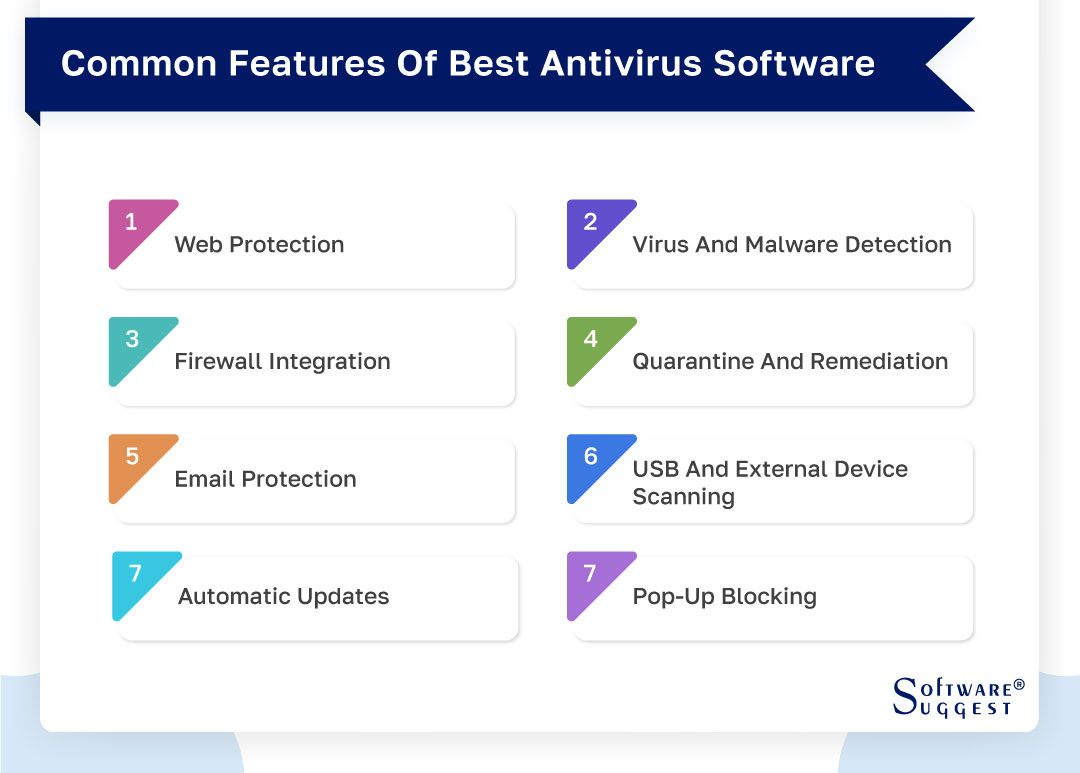
-
Web protection
Web protection is a crucial feature offered by robust antivirus solutions, ensuring a safe online experience. By employing various security measures, these best antivirus programs shield users from online threats. They block access to harmful websites, thwart phishing attempts, and identify malicious downloads that can harm the system.
Through real-time content analysis and URL filtering, this proactive defense offers a secure browsing environment, instilling confidence in users to navigate the digital landscape without fear of cyberattacks. With continuous updates and vigilant monitoring, web protection remains vigilant against ever-evolving threats. Thus, safeguarding users' privacy and data integrity during their internet exploration.
-
Virus and malware detection
The effectiveness of a top-notch antivirus system lies in its exceptional ability to detect and eradicate viruses and malware. By employing a combination of signature-based detection, behavior-based analysis, and heuristic scanning, these solutions continuously monitor system activity to promptly neutralize potential threats.
By quickly addressing suspicious activities, these secure web gateway platforms protect users from data breaches, system compromises, and potential damage caused by malicious software. By utilizing cutting-edge technology, these solutions stay ahead of new and evolving threats, providing users with reliable protection and peace of mind while navigating the digital world.
-
Firewall integration
The integration of robust threat intelligence software with the system's firewall enhances overall security by adding an extra layer of protection. By effectively safeguarding against unauthorized access and data breaches, the firewall acts as a secure barrier between the computer and the internet.
This integration ensures that users can engage in online activities with privacy and confidence, as it prevents external threats from infiltrating the network and compromising sensitive information. The synergy between antivirus and firewall solutions creates a robust defense mechanism, fortifying the user's system against a wide range of cyber threats.
-
Quarantine and remediation
In the event of threat detection, virus protection software must act swiftly and efficiently. The best solution is to promptly quarantine infected files, isolating them to prevent further damage. Additionally, powerful remediation capabilities go beyond detection, actively working to restore and repair any harm caused by malware or viruses.
This proactive approach ensures that users' systems remain optimized and that their valuable data remains intact, protecting against potential data loss and system vulnerabilities. By swiftly containing and resolving threats, antivirus solutions safeguard users' digital assets, offering a sense of security and trust in their computing environment.
-
Email protection
With email being a prime target for cyberattacks, the best antivirus software for Windows incorporates advanced email protection. This crucial feature scans incoming and outgoing messages, attachments, and links to identify and block phishing attempts, spam, and malicious content.
By securing email communications, users are shielded from deceptive schemes that aim to compromise personal information, ensuring a safer digital communication experience. Free antivirus software equipped with email protection enhances productivity and user confidence.
-
USB and external device scanning
The best API security testing tools include the capability to scan and analyze external devices like USB drives, guarding against potential malware infections. External devices can unknowingly harbor harmful files that may infect a system when connected. By detecting and neutralizing threats from USB drives and other external devices, antivirus software ensures that the user's system remains protected against potential risks from these sources.
The ability to scan external devices adds an essential layer of security, preventing the inadvertent spread of malware and bolstering the overall resilience of the user's computing environment.
-
Automatic updates
Antivirus software's effectiveness heavily relies on up-to-date protection. Automatic updates are an integral part of the best antivirus tools, regularly refreshing virus definitions and system enhancements. By continuously updating, the vulnerability assessment tools remain capable of combating the latest malware variants and zero-day threats effectively.
These updates also minimize security vulnerabilities, providing users with consistent and reliable protection against emerging cyber threats. The automatic update process guarantees seamless protection against evolving online threats without any manual intervention required.
-
Pop-up blocking
The best antivirus software for laptops incorporates pop-up blocking capabilities to combat intrusive and potentially harmful online pop-up advertisements. By neutralizing these pop-ups before they appear, DAST tool enhances users' browsing experiences. Also, it guards against potential malware delivery mechanisms hidden within the ads.
This feature ensures a smoother, safer online experience, mitigating the risks associated with unintentional exposure to malicious content. By blocking these intrusive ads, antivirus solutions reduce distractions and potential threats. Hence, it allows users to focus on their online activities with confidence, knowing they are well protected from the pitfalls of the digital world.
What is The Use of Antivirus Software?
Antivirus and computer security software implications have different ways. However, the principle doesn’t change; antivirus and computer security software does what it says but for different types of malware. The software employs defenses against viruses, worms, trojans, bots, and ransomware. Apparently, antivirus and security software can be designed to encounter different types of malware in different ways.
-
Phishing Attacks
Nowadays, people are always under the threat of identifying theft through the plantation of bots or browser hijackers; this is called ‘Phishing.’ The use of antivirus and security software sets off a nuisance like this. Besides, it is crucial to prevent identity theft because once compromised, your identity credentials are helping to commit more cyber crimes. Such use of your identity can put you in unwanted situations.
-
Data Retention
If you govern a business, your computers can have extremely important files, records, and information. Losing these files/data can throw a serious issue for the company. At this stage, if computer antivirus software is installed on your system, the calamity is prevented, and even retention of lost data is possible.
-
Extra defenses for device life increment
It is evident that basic computer antivirus software deals with the effects of any virus. Although frequent virus attacks cost your computer a loss in its lifetime, i.e., your computer gradually deteriorates. So, the importance of placing extra defenses on your system is of the utmost. An antivirus package can be helpful here, as they contain more efficient defense mechanisms than free ones.
-
Saving money
The best antivirus software for laptop download may cost you some money, but it saves you almost $100,000. Yes, that is the average amount demanded by the ransomware if it successfully encrypts your data. So, installing computer antivirus software will prevent your computer from a ransomware attack.
-
Password Protection
Now that internet banking and cloud software are trending, users have a lot of accounts and passwords to take care of, which are generally present on the computer. A virus having access to your computer will also have access to these passwords. This is a severe situation; the passwords can be from your banking credential to social media accounts. So, their vulnerability is the highest concern, and the best antivirus software for pc will restrict access to any virus to your password. Thus, check ultimate cyber security tips and ensure the highest security.
-
Automatic Protection Scans
The best antivirus software for pc will allow you to configure the scheduling of threat scans. You don’t have to check whether the antivirus is doing its job. The automated scans will conduct a threat scan repeatedly on the time interval you set and show pop-up results for your convenience.
What Is The Purpose Of Antivirus Software?
Antivirus software is absolutely necessary for the protection of our digital lives since it shields us from the plethora of dangers that can be found online. The function of antiviral software is investigated in this section. Let's look at them in more depth:
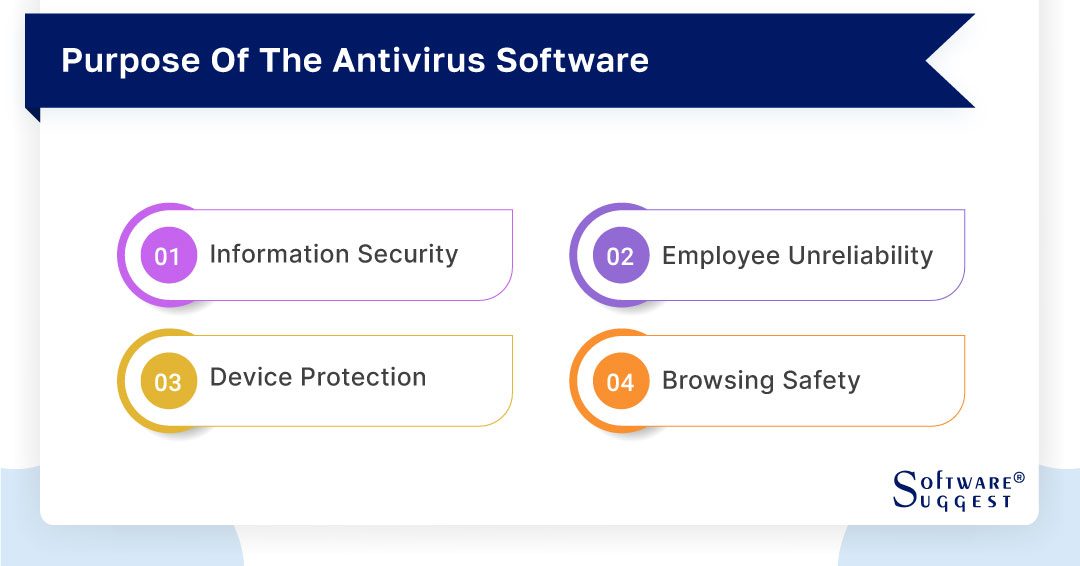
-
Information security
The primary purpose of antivirus software is to maintain information security. Numerous sensitive pieces of information, including private financial information, company information, and personal data, are stored on our computers and other electronic devices.
Viruses, worms, trojans, and ransomware are just a few examples of the sophisticated malware that cybercriminals constantly create. It is aimed to infiltrate systems and steal or compromise valuable data. EDR software uses a combination of signature-based detection, behavior analysis, and heuristics to identify and neutralize these threats before they can cause harm.
-
Employee unreliability
Even with robust security measures, employees can unintentionally compromise the organization's security through human errors. For instance, phishing attempts depend on staff members mistakenly clicking on malicious links or giving sensitive information to attackers posing as reliable sources.
Antivirus software equipped with email protection and web filtering can mitigate these risks by identifying and blocking phishing attempts and suspicious websites. Additionally, antivirus services can prevent the spread of malware through USB devices, minimizing the impact of accidental infections caused by employees plugging in infected drives.
-
Device protection
Antivirus software is instrumental in securing a wide range of devices, including computers, laptops, smartphones, and tablets. With the proliferation of mobile devices, the risks of malware and cyber threats spreading across different platforms have increased significantly. Antivirus software provides cross-platform protection.
They defend against malware that targets specific operating systems or vulnerabilities. Moreover, as Internet of Things (IoT) devices become more prevalent in homes and businesses, antivirus software is extending its scope to safeguard these smart devices. Thus, preventing potential breaches that could compromise home networks or corporate environments.
-
Browsing safety
The internet is rife with dangers, including malicious websites, phishing pages, and infected downloads. Antivirus software includes web protection features that actively block access to dangerous websites and prevent users from inadvertently clicking on harmful links.
Real-time content analysis and URL filtering help ensure that users can browse the web with confidence, free from the fear of falling victim to cyber threats. By actively scanning downloads for malware, antivirus software further reinforces browsing safety. Thus, protecting users from inadvertently downloading infected files that could harm their devices.
What Are The Aspects To Consider Before Choosing The Best Antivirus Software?
The right antivirus solution is a critical component of safeguarding our devices and sensitive information from an ever-growing array of cyber threats. However, choosing the best antivirus software can be challenging, given the wide range of alternatives on the market. Here, we will explore the key points to consider before choosing any antivirus software. Let's see them in detail:

-
Effectiveness
When it comes to selecting antivirus software, effectiveness should be your primary concern. You need a program that can detect and neutralize a wide range of threats, from viruses and malware to trojans, ransomware, and phishing attacks. Prioritize antivirus solutions with high detection rates and minimal false positives to ensure accurate threat identification.
To gauge effectiveness, turn to independent lab tests and user reviews, as they provide valuable insights into the performance of various antivirus programs. Look for a solution that consistently ranks well in these assessments and has a reputation for delivering robust protection.
-
Real-time & level of protection
Real-time protection is an absolute must-have as it allows the antivirus software to identify and block threats as they occur, safeguarding your system and data from immediate harm. Search for software that provides proactive identification of threats and real-time scanning capabilities. Take into account the antivirus program's level of protection as well.
Some may offer basic protection, while others go above and beyond with comprehensive security features like firewall integration, email protection, and USB scanning. Examine your unique requirements and select software that meets the level of security demanded for your devices and online activity.
-
Cost and licensing
Affordability is a critical factor to consider when making your antivirus software choice. Prices can vary significantly depending on the features and level of protection offered. A membership or one-time purchase may be necessary for some antivirus programs, while others may include free versions with restricted features.
Take your budget into account and consider the number of devices you need to protect, as some licenses may cover multiple devices. Additionally, watch out for any hidden fees or renewal costs to make an informed decision about the overall cost-effectiveness of the antivirus software.
-
Privacy policy
Frequent updates play a vital role in keeping antivirus software effective and robust. In today's rapidly evolving cyber landscape, new threats constantly emerge, making regular updates essential to ensure your antivirus remains capable of dealing with these dangers. When choosing an antivirus solution, it's crucial to consider the vendor's update policy.
Opt for software that offers automatic updates, as this ensures your protection is continuously up-to-date without the need for manual intervention. By doing so, you can safeguard your system and data more effectively against the ever-changing cyber risks that loom in the digital world.
-
Updates and support
Frequent updates are crucial to maintaining the effectiveness of antivirus software. As cyber threats constantly evolve, updates ensure that your antivirus solution remains equipped to handle new and emerging dangers. Consider the frequency and delivery method of updates offered by the vendor.
Ideally, opt for antivirus software that provides automatic updates, ensuring continuous protection without requiring manual intervention. Consider the vendor's customer service and response as well in case you run into any problems or have inquiries about the product.
Top 5 Antivirus Software Comparison
|
Name
|
Free Trial
|
Demo
|
Pricing
|
|---|---|---|---|
|
60 Days |
Yes |
Starting price at $0.80/month | |
|
30 Days |
Yes |
Starting price at $1.82/month |
|
|
60 Days |
Yes |
Starting price at $0.92/month |
|
|
30 Days |
Yes |
Starting price at $1.21/month |
|
|
30 Days |
Yes |
Starting price at $2.58/month |
While the internet offers endless opportunities, it also presents various cyber threats that could compromise sensitive data on your computer. Antivirus software is an essential aspect of online security that can help keep you safe. Now, we will see the top 5 antivirus software programs on the market with features, pros, cons, and pricing for each of them.
1. Norton antivirus
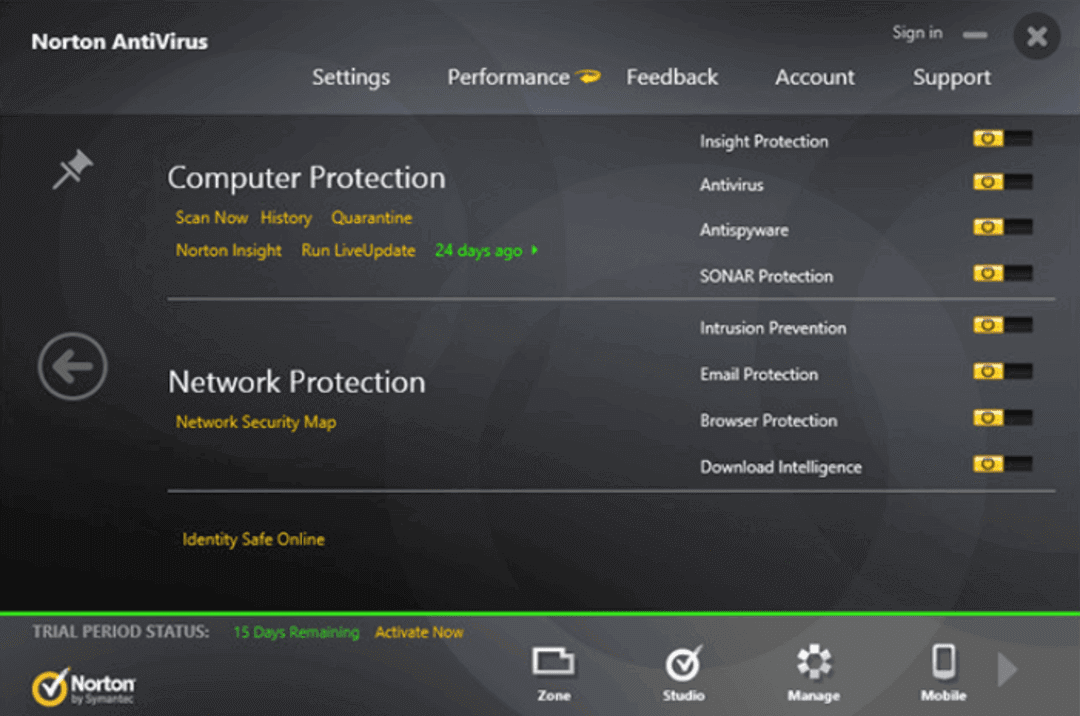
Norton is a popular cybersecurity software. It offers comprehensive protection against a variety of online threats like viruses, malware, ransomware, and phishing attempts. Users can be sure to have a secure online experience because of its strong features, which include real-time protection, a firewall, and a password manager. Users may simply manage and alter their security settings thanks to the intuitive UI. Furthermore, Norton offers outstanding customer support to make sure users always get the help they require.
- Intrusion prevention system (IPS)
- AntiVirus with advanced machine learning
- Reputation protection (Insight)
- Behavioral protection
- Proactive exploit protection (PEP)
- Power eraser
- Norton stands out as a comprehensive antivirus solution, effectively safeguarding against viruses, malware, phishing scams, spyware, and various online threats
- The user-friendly website simplifies navigation and provides clear instructions for easy installation and utilization of their products
- Customers benefit from 24x7 support via chat, phone, or email, ensuring prompt assistance whenever required
- Supporting multiple platforms, such as Windows, Mac, Android, and iOS, Norton allows users to protect all their devices with one account
- With a strong reputation backed by numerous awards and accolades, Norton's commitment to delivering top-notch antivirus solutions is evident
- One drawback of Norton's antivirus software is its potential to cause system slowdowns, which might not suit users seeking high-speed performance
- Compatibility issues with other installed software on your computer can sometimes arise, leading to additional effort to resolve these concerns
Pricing
- Plus- $9.71 per year
- Standard starts from- $10.93 per year
- Delux starts from- $14.58 per year
2. Bitdefender
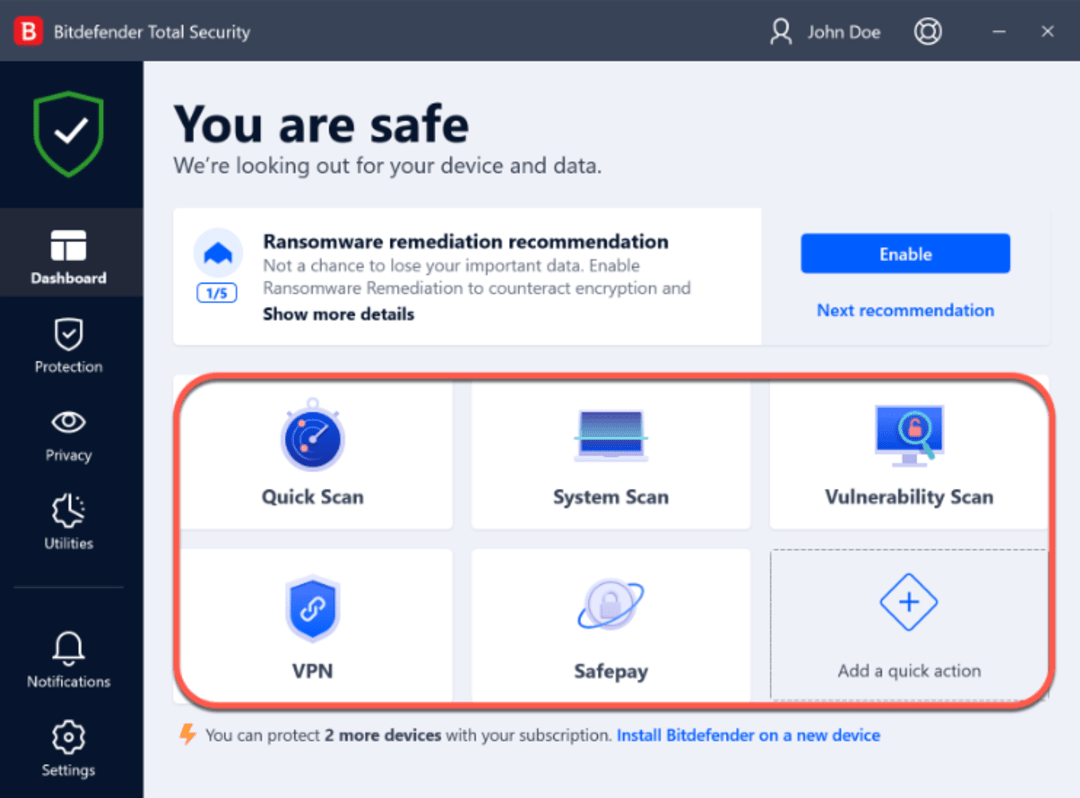
Bitdefender, a prominent cybersecurity firm, provides a diverse array of security products tailored for both home and business users. Equipped with cutting-edge malware detection and real-time protection, Bitdefender ensures constant shielding against online threats. Their product range encompasses antivirus software, internet security software, and robust enterprise-level solutions with comprehensive security features.
- Unified prevention, detection & response
- Unmatched attack prevention
- Extended detection and response (XDR)
- Cyber resilience
- Cybersecurity compliance
- Managed security services
- Secure cloud workloads
- Bitdefender incorporates cutting-edge threat detection technologies like behavioral analysis, machine learning, and heuristics, effectively thwarting even the most sophisticated threats and attacks
- The user interface of Bitdefender is intuitively designed, catering to both beginners and seasoned users, ensuring a user-friendly experience
- The platform operates efficiently without causing system slowdowns, maintaining smooth performance during system use
- With multi-layer protection, Bitdefender shields against various threats, encompassing malware, viruses, spyware, and ransomware
- Bitdefender's security features are comprehensive, including antivirus, firewall, anti-spam, anti-phishing, and parental control, ensuring complete protection for your digital life
- Bitdefender has limited customization options, which restricts users from accessing advanced settings within the application
- Customer support services offered by Bitdefender are inconsistent, with some users encountering extended wait times and receiving unsatisfactory responses
Pricing
It starts from:
- Total security- $21.88 per year
- Internet security- $18.60 per year
- Antivirus plus- $13.33 per year
3. Avira
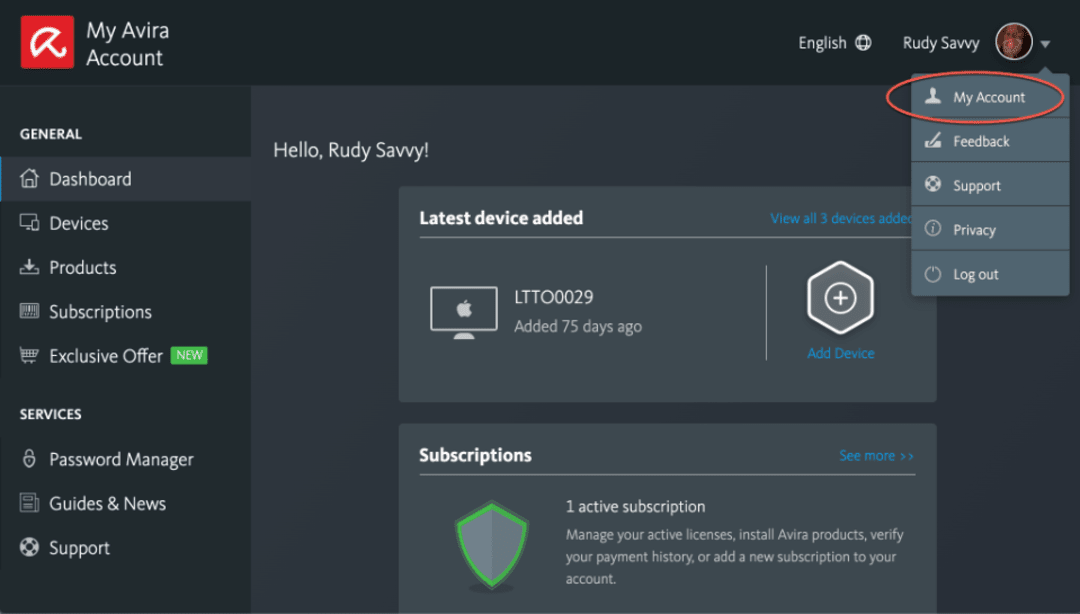
Avira is a reputed software provider. It focuses on VPN, optimization tools, and antivirus software. The company's antivirus software has won praise for its performance and is excellent at finding and fighting infections. Users of Avira's VPN may browse the internet privately and securely, and they can also speed up their devices with their optimization tools. The program is simple to use and compatible with both Windows and Mac computers. In general, everyone wishing to protect their devices and data should consider using Avira.
- PC cleaner
- Firewall
- Unlimited VPN
- Password management
- Complete file encryption
- Avira has gained recognition for its robust antivirus protection, capable of detecting and removing various types of malware, including viruses, Trojans, worms, and spyware
- Users can benefit from Avira's flexible pricing plans, allowing them to protect multiple devices, including PCs, Macs, and mobile devices, using a single license
- Avira's antivirus software provides real-time protection, constantly monitoring devices for potential threats and promptly alerting users of any suspicious activity
- The user interface of Avira is intuitive and easy to navigate, providing users with a comprehensive overview of their device's security status
- In addition to antivirus protection, Avira includes supplementary features like a secure web browser, password manager, and system optimizer, enhancing online security and overall system performance
- The customer support offered by Avira is limited, as it only provides email and phone support for paid subscribers
- Avira's scanning speed can be sluggish, particularly when dealing with large files or folders, leading to potential delays
- Some users have reported instances where Avira's antivirus software mistakenly flagged legitimate software as malware, causing frustration
Pricing
It starts from:
- Prime- $11.15 per year
- Internet security- $14.34 per year
- Antivirus pro- $24.48 per year
4. Mcafee
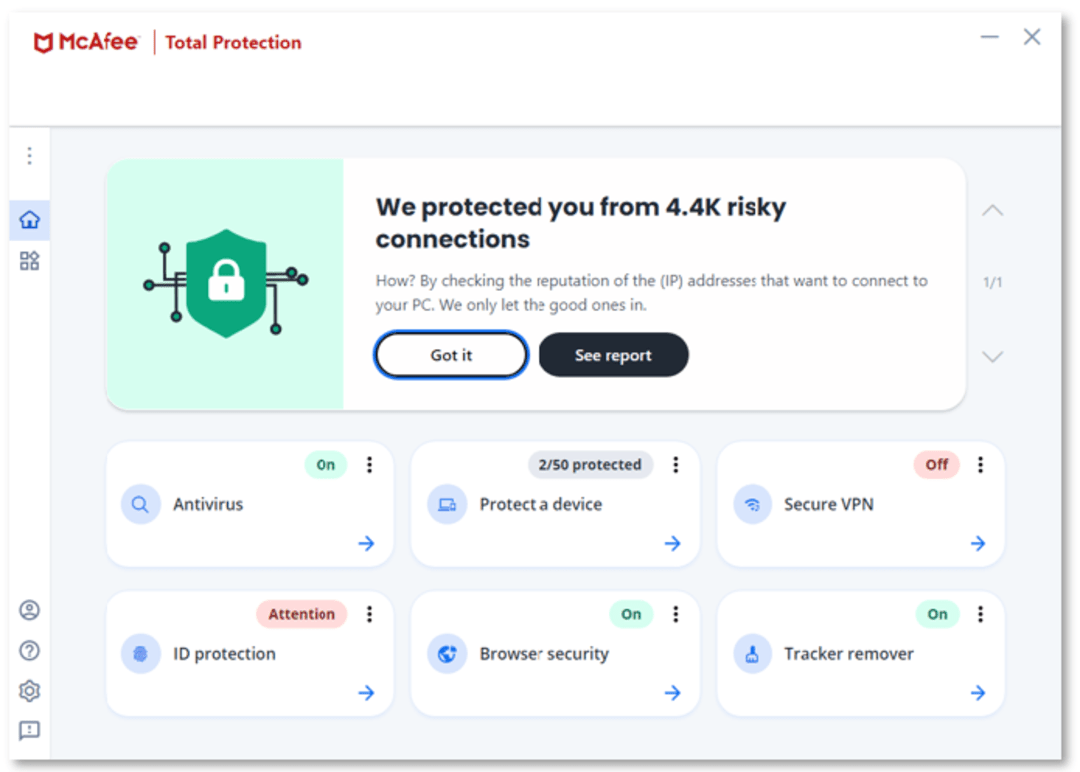
McAfee Antivirus is a robust piece of software that will protect your computer against other forms of potentially harmful software. This piece of software comes packed with a variety of cutting-edge capabilities, some of which include real-time scanning, automated updates, and a quarantine option. Users will find it simple to keep their computers safe from dangers posed by the internet thanks to the intuitive design of McAfee Antivirus's user interface.
- Password manager
- Protection score
- Firewall
- File shredder
- Identity monitoring
- McAfee Antivirus is known for providing overall protection against malware, viruses, Trojans, and other online threats
- Its user interface is incredibly easy to navigate, with all the essential features easily accessible from the homepage
- The antivirus works across all platforms, including MacOS, Windows, Android, and iOS
- McAfee Antivirus offers multi-device protection packages for personal as well as enterprise use, and this makes it a versatile option for those who have multiple devices to protect
- Along with the core antivirus features, McAfee includes a number of additional features like parental controls, secure browsing, anti-spam filtering, and more
- McAfee can be resource-intensive, which can slow down the computer's performance
- Sometimes, McAfee can be incompatible with certain software, causing installation errors
Pricing
- Standard- $14.58 per year
- Essential- $17.01 per year
- Premium- $20.65 per year
5. Kaspersky antivirus
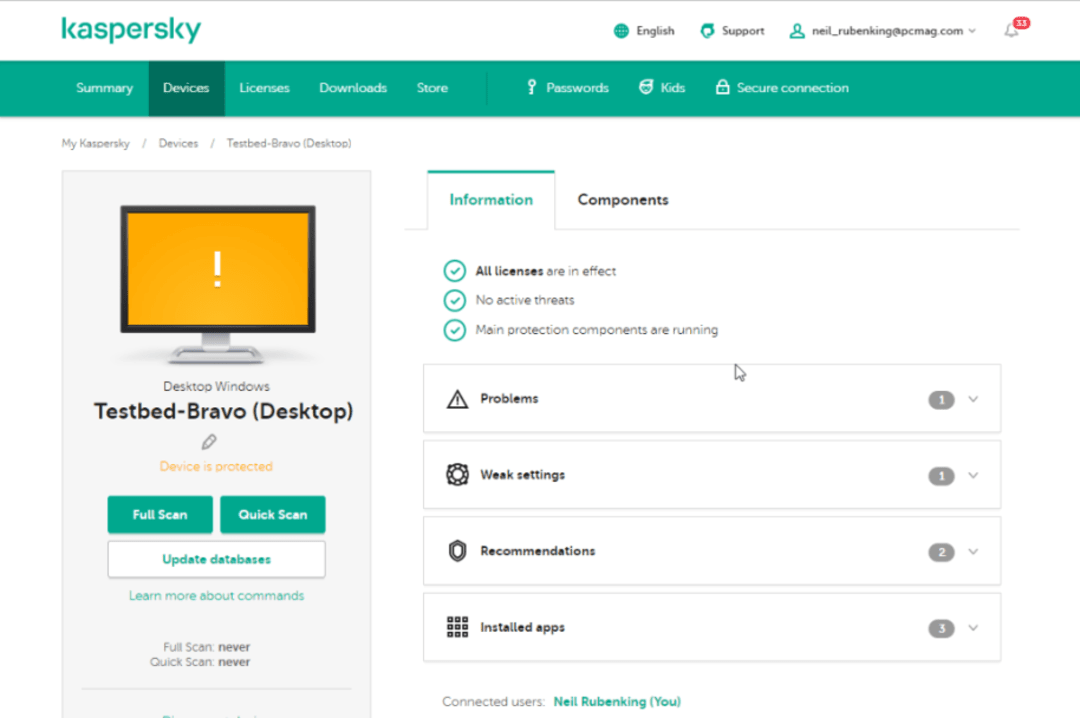
Kaspersky is a renowned cybersecurity company that offers a range of software solutions to help individuals and establishments protect their data and systems from cyber threats. Kaspersky Total Security, Internet Security, Anti-Virus, and other programs are among their software offerings. These solutions offer the highest level of protection against malware, viruses, ransomware, and other cyberattacks because of their cutting-edge features, including real-time protection, web filtering, and anti-phishing tools.
- Endpoint protection
- Data protection
- Network protection
- Threat management and defense
- Hybrid cloud security
- Kaspersky offers complete protection against malware and cyber threats and they also provide advanced tools for internet security, privacy protection, and identity theft prevention
- The platform has a clean and intuitive interface that makes it easy even for non-tech-savvy users to set up and customize their security settings
- It has consistently scored high in independent software testing, showcasing its ability to provide top-notch security protection without impacting system performance
- Kaspersky offers licenses that can be used across multiple devices – from laptops and PCs to smartphones and tablets – making it a cost-effective option for users with multiple devices
- The software provides excellent customer support and they also have a comprehensive knowledge base and community forums where users can find answers to common queries
- While Kaspersky offers exceptional security features, it is relatively expensive compared to other antivirus software in the market, which may be a deal breaker for some users
- The free version of Kaspersky is limited in terms of features and capabilities, making it less attractive compared to other free alternatives in the market
Pricing
It starts from:-
- Small business- $31.00 per year
- Medium businesses- $300.20 per year
- Enterprises- Custom pricing
Challenges With Antivirus Software
Antivirus software plays a crucial role in safeguarding computer systems from various cyber threats, including malware, viruses, and other malicious software. However, despite their importance, antivirus programs are not without challenges. Here will explore 5 prominent challenges faced by antivirus software:-
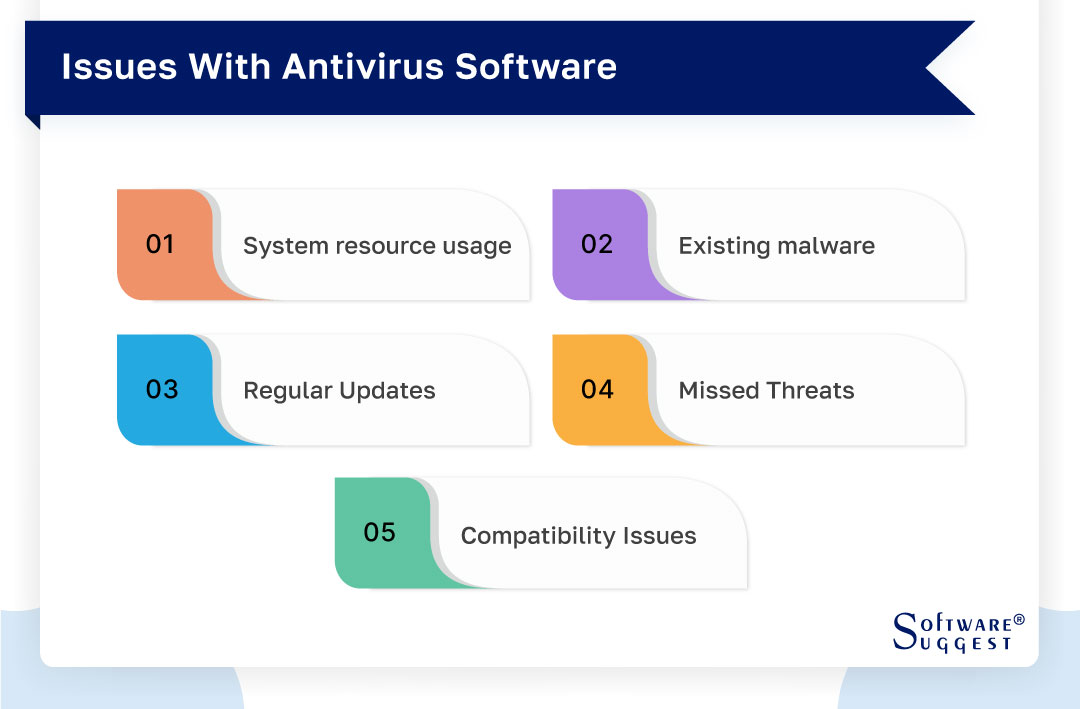
-
System resource usage
Antivirus software faces a significant challenge in balancing effective protection with minimal impact on system resources. These programs constantly monitor system activities, consuming CPU, memory, and disk resources.
This can lead to noticeable system slowdowns and reduced performance, especially on older or less powerful computers. Antivirus developers strive to optimize resource usage, employing techniques like real-time scanning adjustments and low-priority background tasks to mitigate this impact.
-
Existing malware
The ever-evolving landscape of malware presents a continuous challenge for antivirus software. Signature-based detection helps identify known malware patterns, but novel or customized threats can bypass these defenses. To counter this, antivirus companies employ heuristic analysis and behavior-based detection.
Thus, attempting to recognize suspicious activities even without specific signatures. Additionally, threat intelligence sharing and collaborative efforts among security experts aid in combating new malware variants across the cybersecurity community.
-
Regular updates
Keeping antivirus software up-to-date is critical for effective protection. Regular updates from vendors include the latest virus definitions and detection algorithms designed to combat emerging threats.
However, getting users to maintain timely updates remains a challenge. Antivirus providers adopt automatic update mechanisms and implement user-friendly notifications to encourage users to stay protected without disrupting their work or causing bandwidth concerns.
-
Missed threats
Although antivirus software strives to provide comprehensive protection, no solution can guarantee absolute immunity. Malware can occasionally go undetected due to the delay between its release and detection, the use of zero-day exploits, or advanced evasion techniques.
In order to enhance detection rates, some antivirus programs incorporate cloud-based threat intelligence. They do this by utilizing collective knowledge to identify and respond to new threats more effectively.
-
Compatibility issues
Ensuring seamless integration with various operating systems and applications presents a complex challenge for antivirus developers. The diverse computing landscape can lead to compatibility issues, particularly with less common or specialized software.
Vendors engage in continuous testing and collaboration with software developers to resolve conflicts promptly. User feedback and robust customer support help address compatibility concerns and improve the overall user experience.
Conclusion
Choosing the right antivirus software is crucial in safeguarding your digital life against ever-evolving cyber threats. After careful evaluation of various options, it is evident that a top-tier antivirus solution should encompass essential features. Additionally, considering factors such as system compatibility, customer support, and pricing are vital in making the best decision.
Based on our research, the top contenders for the best antivirus software are Norton AntiVirus, Bitdefender, Avira, McAfee, and Kaspersky Anti-Virus. Each of these options offers a robust security suite and has received positive user feedback for their effectiveness in combating cyber threats.
Remember that a trustworthy antivirus establishment is an investment in your online security and peace of mind. In order to create a secure digital environment for you and your devices, be watchful, keep your software up to date, and take educated action.
FAQs
A computer security software called antivirus software is used to stop, find, and get rid of viruses. As opposed to this, a virus is a type of malware that spreads through a device anytime a file or software is run.
Antivirus is still recommended even if you're using a Mac or Windows laptop device, which both have some built-in virus protection. Installing third-party antivirus software is recommended for complete security, including endpoint protection and response, blocking against malware and possibly unwanted apps, and other features.
Antivirus software typically uses a combination of signature-based detection and behavior-based detection to identify and block malware and other threats. Signature-based detection works by matching the file or code being analyzed to a database of known threats, while behavior-based detection monitors the behavior of programs and processes on the device to identify suspicious activity.
The signs that your device may be infected with malware can vary, but some common symptoms include slow performance, frequent crashes or freezes, pop-up ads or unwanted programs, changes to your settings or browser homepage, and unexplained network activity.
Malware is a broad term that refers to any software designed to harm or exploit a device or network. Viruses are specific types of malware that can replicate themselves and spread from one device to another.
Antivirus solutions play a crucial role in shielding your devices from malware and potential dangers. However, relying solely on antivirus software may not suffice for complete protection. In order to ensure robust defense for your devices, it's vital to adopt sound cybersecurity practices. Your digital environment can be protected by updating your software frequently, using strong passwords, and being wary of shady emails and websites.
It is not recommended to have more than one antivirus software running on your computer at the same time, as they may interfere with each other and cause conflicts. Instead, choose one reputable antivirus program and ensure that it is up-to-date and running effectively.
Antivirus software can sometimes slow down your computer, particularly during scans or updates. However, reputable antivirus programs are designed to minimize performance impact as much as possible The benefits of having antivirus software generally outweigh the potential slowdown.
By Countries
By Industries






















